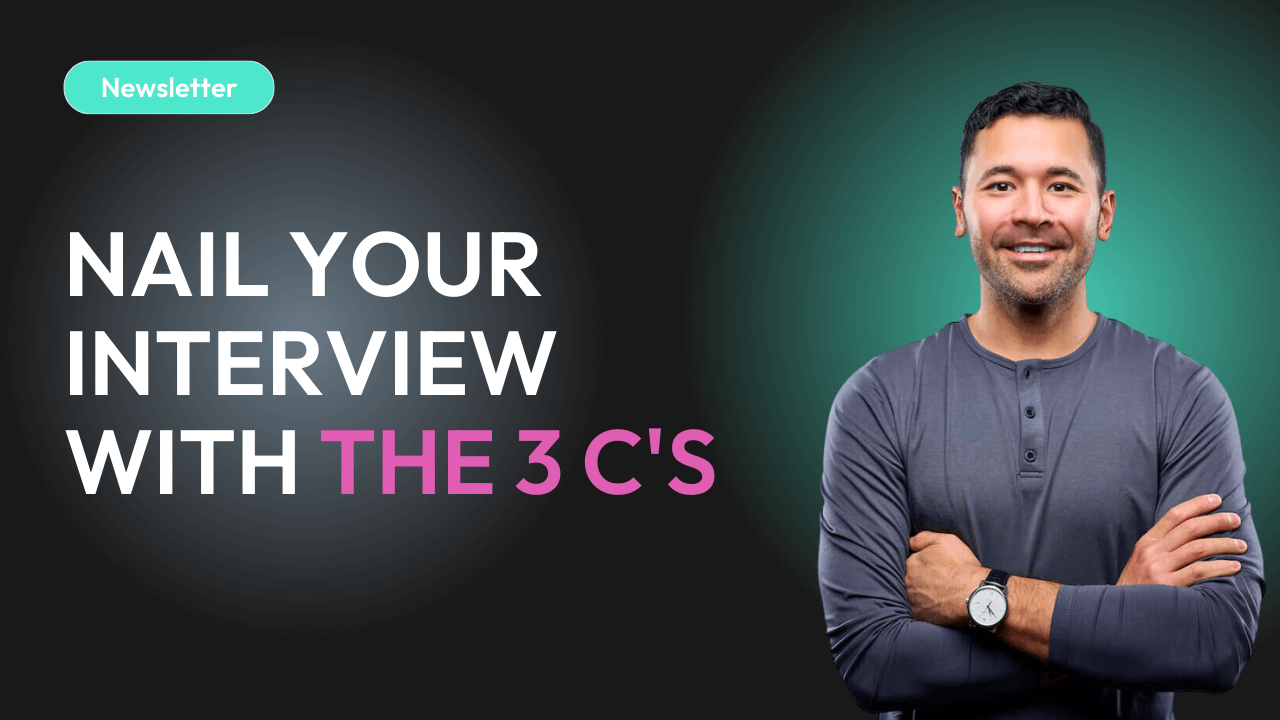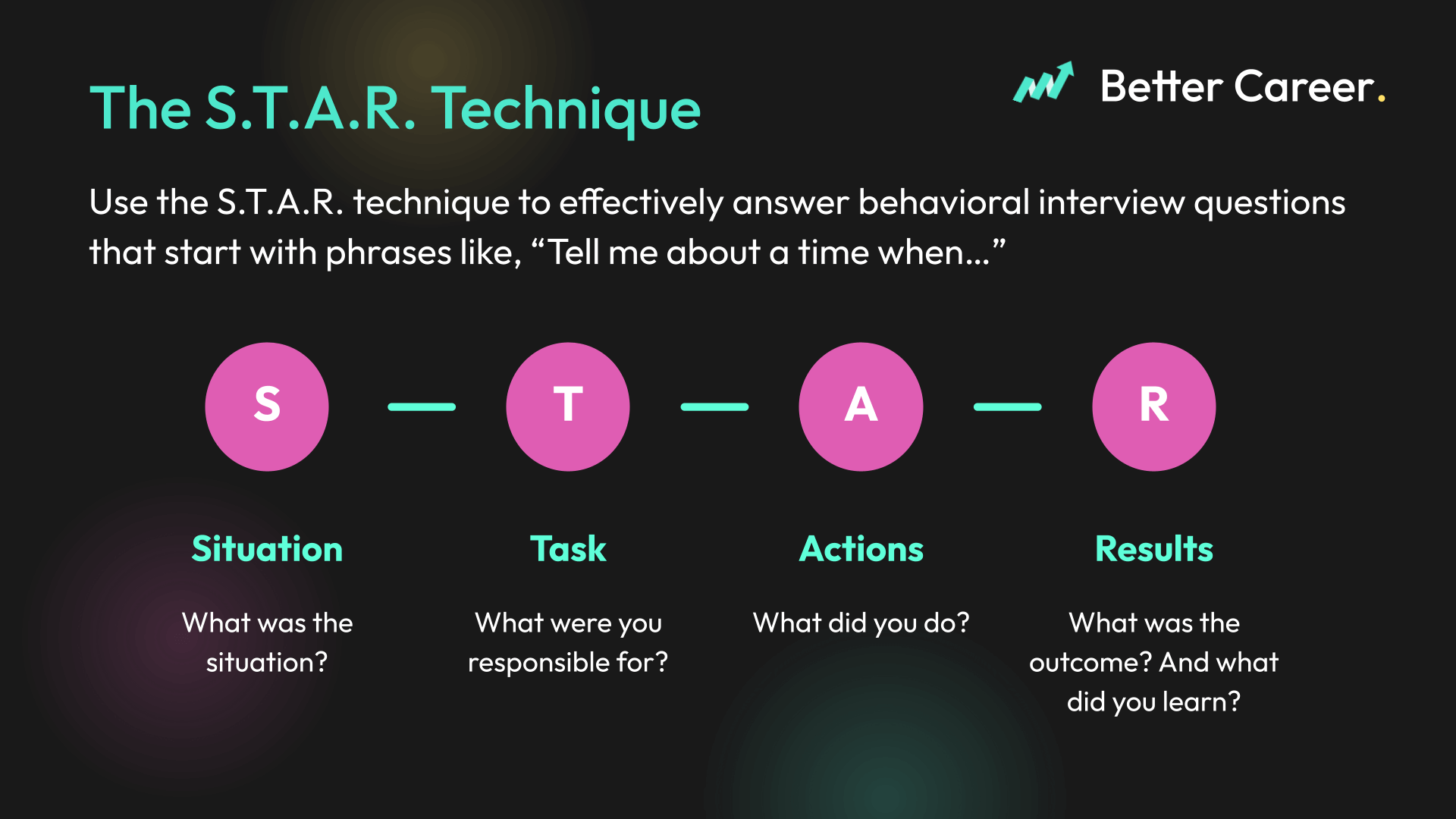
Nail your Next Interview with the 3 C's!
Oct 29, 2023Read time: 4 minutes
Preparing for an upcoming interview?
I want to introduce an interview technique to help you streamline your responses and WOW your interviewers.
You might assume I'm about to cover the well-known S.T.A.R. method. While it's invaluable, today, I want to spotlight another technique that you’ve probably never heard of. But first, let’s take a brief look at the S.T.A.R. method and when it’s relevant.
What's the S.T.A.R. Method?
Most of us have used or at least heard of the S.T.A.R. method. It's a tried-and-true framework for tackling behavioral interview questions like "Tell me about a time when you faced a challenge with a client.”

It offers a systematic approach to formulating answers to behavioral questions. If you haven't incorporated it into your interview strategy, I highly recommend it.
But it’s not the only interview technique you should learn. Here’s why:
As popular (and effective) as the S.T.A.R. method is, it doesn’t work for every interview question.
For instance, it doesn't quite fit for frequently asked questions like:
- Can you tell me a little about yourself?
- What interests you about this role/company?
- Where do you see yourself in five years?
- Why are you looking to leave your current position?
- How do you handle stress or pressure?
- What is your greatest professional achievement?
- Describe your work style.
So, if not the S.T.A.R. method, then what? 🤔
Enter the 3 C’s Technique 🙌
That’s where the 3 C’s Technique comes into play. This approach ensures your responses are Concise, Compelling, and Concrete. It's a game-changer!

Let’s break down each facet of this technique and how it can drastically improve your interview responses.
1. Concise
Keep it Short and Impactful
In an interview, time is important, and the last thing you want to do is waste precious time rambling! Most job seekers struggle with delivering lengthy and disorganized interview responses.
And let’s be real. It’s hard not to be long-winded when you’re nervous!
But here's the key: Interviewers, especially hiring managers, favor candidates who can deliver their message succinctly without skimping on essential details.
A concise response not only demonstrates confidence but also showcases effective communication skills.
To ensure you’re responses are concise, consider boiling down your responses to 2-3 points. By simplifying your response into 2-3 primary points, it helps you be succinct and emphasize the most relevant details.
For example, when asked, “What is your approach to Discovery?”
Your response could look something like:
"I believe Discovery is pivotal in sales. My strategy revolves around three pillars: Firstly, I collaborate with my AE, ensuring we're aligned. This entails strategic discussions about gleaning essential insights from the prospect to advance the deal. Secondly, I view discovery as a continuous journey. Each interaction with a prospect is a fresh chance to understand them better and tailor a solution for their specific needs. Thirdly, [insert 3rd point]…"
This question could easily kickstart a 5-minute response, but if you focus on making 2-3 impactful points, you’ll deliver a more effective response, sound more confident, and prevent yourself from rambling.
📌 Takeaway: To remain concise, narrow down your responses to 2-3 key points.
2. Compelling
Showcase Your Enthusiasm and Passion
Your responses should not only answer the question but also capture the interviewer's attention and help them remember you.
Share your passion for your work and the position you are interviewing for. You should be enthusiastic about the company, its services/solutions, and the role.
The best way to demonstrate genuine enthusiasm is to do your research and really spend the time to learn more about the company.
Infuse your responses with specifics about the company/role and explain what makes you most excited about the opportunity.
For example, when asked, “Why do you want to work here?”
Your response could look something like:
“I am genuinely excited about the innovative approaches your company takes towards [industry-specific challenge], and I am eager to contribute my skills and passion for [relevant field] to drive further success. I believe my background perfectly aligns with the team’s current need for [specific expertise] and would love the opportunity to leverage my experience to help them achieve [team’s unique goal]…”
Notice how this response reiterates excitement for the role and highlights specific details related to the company. If you say you’re passionate about the role but can’t explain why, it won’t resonate with your interviewers.
📌 Takeaway: Demonstrate genuine enthusiasm by infusing specifics about the company into your answers.
3. Concrete
Provide Specific Examples
Giving specific examples from your past experiences validates your skills and abilities. It shows that you're not just saying the right things but have tangible evidence to support your claims.
In my experience as a hiring manager, it’s common to have candidates give vague or ambiguous responses, which makes it hard to assess their skills and experience accurately.
You want to make it EASY for the interviewers to understand the impact you’ve had in your prior roles and how it translates to the current role.
That’s why concrete examples are so important. They’re your own personal success stories, speaking to the unique value you’ve brought to the table across your prior roles.
Prepare specific work examples to sprinkle throughout your interview responses.
For example, when asked, “How do you handle stress at work?”
Your response could look something like:
“In high-pressure situations, I usually take a few minutes to do breathing exercises, then focus on prioritizing tasks. For example, in my last job, when faced with a tight deadline for implementing a new solution for our largest client, I broke the project into smaller tasks and delegated them based on my team members' strengths and bandwidth, ensuring we could not only meet the deadline but also guarantee that the client was satisfied. Stressful situations will always pop up at work, and my approach is to focus on the highest priority items and not get overwhelmed in the process.”
This response is powerful because it highlights a real-life example of how you’ve dealt with stress on the job.
📌 Takeaway: Prepare work-related stories that positively demonstrate your skills.
Why Use the 3 C’s Technique?
In interviews, your goal is to leave a lasting impression, proving that you’re the ideal candidate for the position.
If you sound unsure, disorganized, or lack confidence in your interview responses, you’ll likely miss the opportunity to wow your interviewers.
The 3 C’s technique helps you structure your answers in a way that showcases your qualifications, demonstrates your passion, and leaves no doubt about your capabilities.
It will help you communicate more effectively, making you stand out in this competitive job market!
So, in your next interview, keep your answers concise, compelling, and concrete, and watch as you leave a lasting, positive impression on your interviewers.
Best of luck in your job search, and remember, preparation is key!
See you next Sunday! 👋
Yuji
1% BETTER EVERYDAY 🌟
Try the Technique: Before your next interview, practice answering common interview questions using the Three C Technique. Focus on keeping your responses concise, infusing them with enthusiasm, and providing specific examples.
If you could use help landing your next AE or SE role, we can help! Apply to work with us 1-on-1. We'll personally reach out to chat about how we can help you accelerate your job search.
